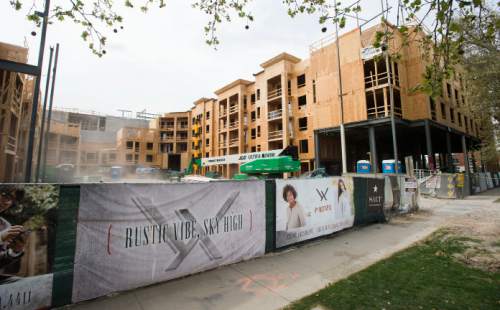This is an archived article that was published on sltrib.com in 2016, and information in the article may be outdated. It is provided only for personal research purposes and may not be reprinted.
A clash may be looming over the fees Salt Lake City charges on new construction to pay for growth-related demand on municipal services.
Mayor Jackie Biskupski's office released a consultant's study Monday, calling for overhauls to impact fees that would substantially raise charges on some residential construction while lowering those on commercial projects.
Revised charges on new development are essential, officials say, to help offset added demand on parks, roads and public safety services as the city grows.
The draft plan, which has Biskupski's initial support, is emerging as the city's yearlong moratorium on all impact fees is set to expire Nov. 1.
Under the new analysis, impact fees could jump by as much as 62 percent on new single-family homes within city limits, to $5,598 per home. Fees on new apartments would rise a more modest 5 percent, to $3,456 per dwelling.
One-time charges on commercial projects — such as new stores, offices and industrial buildings — would fall by between 45 percent and 87 percent, based on the study by financial-consulting firm Lewis Young Robertson & Burningham.
"When you look at the model and the philosophy of the plan, the numbers bear it out," said Mike Reberg, director of the city's Department of Community and Neighborhoods. "That's what the mayor is looking at in this."
But some City Council members worry there is too little time to adequately debate the complex issue before the moratorium ends. The study, initially completed in July, is only surfacing this week for public scrutiny.
"We are pushed up against a wall," Councilman Derek Kitchen lamented Monday.
Among other metrics, the study assumes Utah's capital — and its current population of nearly 193,000 — will add up to 28,208 residents during the next 10 years, with construction of 545 single-family homes and 7,064 apartments. It also projects growth in commercial construction will continue through 2025.
Assuming most of residential fees will be passed on to homebuyers, it's unclear what impact the charges will have on housing prices, which have been trending sharply upward along the Wasatch Front.
Increasing the city's stocks of housing affordable to residents with lower incomes is a top political priority for the mayor and council.
Mike Akerlow, director of housing and neighborhood development, noted that city leaders have the ability to exempt such affordable projects from impact fees altogether.
On Tuesday, the fee study will be the focus of a discussion at City Hall with developers, who were widely critical of a dramatic spike in impact fees in 2013. That increase, approved under then-Mayor Ralph Becker, was later partly rolled back before the moratorium took effect.
On Thursday, the study will go to a full public hearing, also at City Hall, starting at 6 p.m.
Findings from both those meetings would be incorporated in the plan before it goes to the council for review and possible approval, Reberg said.
Kitchen warned the city risks losing millions of dollars amid a building boom if leaders fail to adopt a new impact-fee structure and must extend the moratorium.
Reberg noted the council could choose to revert to the city's previous fee structure until it finalizes a new one.
He said the mayor was likely to send her final proposal to the council in early October.
Twitter: @TonySemerad



